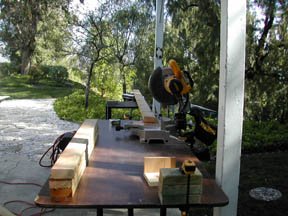|
Gaining Experience
"Much of what you see is the result of practice. The rest is simply work." Many adventures awaiting a beginning woodworker will be overcome by gaining experience. We all know that's true throughout life anyways, but it ought to be said out loud once in awhile. If you are swinging a hammer, you'll hit your finger on occasion. When you fire up a table saw, you're going to fling some dust into the air. Acknowledging the obvious is tiresome, but that's where experience comes in. The first few times you perform any task is different from the many times after. A pottery expert expressed it this way: "I envy you for this very moment. You will never again feel clay on a wheel for the very first time. Let's begin." It takes guts to start woodworking. Cutting a piece of $40 lumber requires forethought, practice, and optimism. Each project takes a degree of nerve. You are putting your skills to the test every time. Then your work must endure the scrutiny of the years afterward. West Hills Wood also believes there is such a thing as too much experience. That's what happens when you get so wrapped up in a process that the larger goal is lost. Think of the TV cooking shows where they chastise anyway who dares use chicken broth from a can (it's sooo easy to make it yourself!), herbs from a jar (just grow them in your garden!), or frozen meats (get some daily from your butcher!). All well and good, but how about we just make dinner? Woodworkers can fall into the same snooty trap. Hand cut mortise and tenon joinery (on a spice rack!), resawing old growth trees with a backyard harvester (you do have one of those, right!), fifteen coats of hand-rubbed lacquer (no doubt mixed with a variety of thinners, additives, shiny-uppers, and other secret ingredients). Jeez, can we just build a box and be done with it? Back to the point of gaining experience. Beginning woodworkers will do themselves a tremendous favor by building simple projects first. Between the lack of tools, skills, and patience, starting hard will only prove discouraging and wasteful. Look online for woodworking clubs in your area, look at the bulletin board at your local lumber yard, or check out the night school class schedule. These are the simplest places to get quality advice and direction. If your neighbor does woodworking, talk to the guy. Bring him one of your projects and ask about other ways to build the same project. Don't be afraid to laugh, fail, or try.
|
